In recent days, a significant health crisis has unfolded, linked to a popular menu item at McDonald’s. The Centers for Disease Control and Prevention (CDC) announced an outbreak of E. coli associated with the fast-food giant’s Quarter Pounders, affecting at least 75 individuals across 13 states. This alarming situation has raised concerns not only about public health but also about the operational sustainability of one of the most recognized brands in the world.
The CDC’s investigation into this outbreak has revealed troubling statistics. Among the reported cases, 22 individuals have required hospitalization, and tragically, there has been one confirmed death of an elderly individual in Colorado. The infections have been documented in a wide age range, from teenagers to seniors, illustrating that E. coli does not discriminate. Furthermore, the CDC cautioned that actual case numbers are likely underreported since many individuals who experience mild symptoms may not seek medical attention or undergo testing for this bacteria.
The potential seriousness of some cases cannot be overstated. Among the ill, two patients developed hemolytic uremic syndrome (HUS), a life-threatening complication that can lead to kidney failure. This underscores the critical nature of the outbreak and highlights the necessity for swift and effective remedial actions.
As investigations progress, health officials are focusing on possible contaminants associated with the Quarter Pounder. Initial suspicions point towards the slivered onions, sourced from California-based Taylor Farms. This supplier has since recalled several onion products due to potential E. coli contamination. In response to the outbreak, McDonald’s has taken decisive action, instructing restaurants in affected areas to halt the use of slivered onions and to temporarily cease serving Quarter Pounders altogether in various states, including Colorado, Kansas, and parts of Idaho, among others.
However, the scrutiny does not stop at the onions. Federal agencies are also examining the beef patties that play a central role in the Quarter Pounder. An extensive investigation is critical, as burgers are a staple item that significantly contributes to McDonald’s revenue.
The outbreak has had immediate repercussions on McDonald’s stock performance; shares dipped by 2% following the CDC’s update and have experienced a 6% decline since the initial report of the outbreak. Market analysts are closely watching how this incident might impact sales, especially in the context of McDonald’s recent struggles with stagnant U.S. sales and consumer hesitance due to escalating prices.
Interestingly, McDonald’s response reflects broader trends in the fast-food industry. As consumers become increasingly price-sensitive, the company has turned to value meal promotions. However, the current crisis threatens to derail those efforts. The forthcoming earnings report could shed light on how the situation has affected customer traffic and sales patterns, particularly during a period of already weak performance.
In navigating the predicament, McDonald’s is keen to reassure customers about the safety of its menu, emphasizing that health and safety are paramount. Analysts suggest that barring a more severe crisis, any lasting damage to the brand’s reputation may be mitigated. Drawing parallels to a previous E. coli outbreak linked to Wendy’s, some expect that McDonald’s could recover if it handles the situation effectively.
Moving forward, the fast-food giant may need to reinforce its food safety protocols to restore consumer confidence. The potential for lasting effects on consumer choice remains a crucial concern. As the investigation continues and as McDonald’s manages public relations in tandem, there lies an opportunity for the company to reaffirm its commitment to quality and safety.
The E. coli outbreak associated with McDonald’s Quarter Pounders serves as a stark reminder of the vulnerabilities within the food supply chain. As the CDC and health officials work diligently to uncover the outbreak’s origins, McDonald’s faces the dual challenge of safeguarding public health while navigating the potential ramifications on its brand and sales. The coming weeks will be pivotal for the company as it strives to regain trust and mitigate the impact of this health crisis.


Leave a Reply